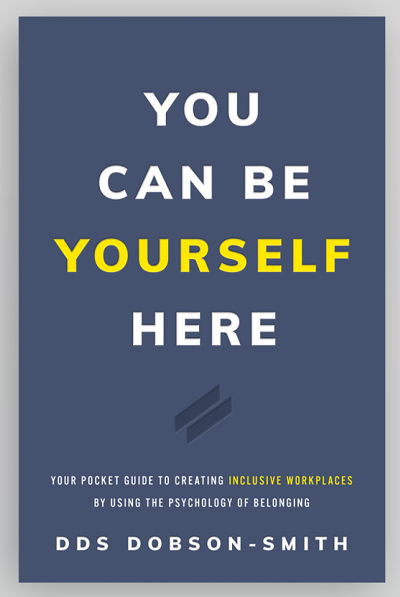
DDS Dobson-Smith’s new book is aptly entitled You Can Be Yourself Here: Your Pocket Guide to Creating Inclusive Workplaces by Using the Psychology of Belonging. As the beginning of the christening suggests, the book is both a guide book and something of a literary love letter to celebrating cultural changes affecting individuals entering the modern-day workplace. Through extensive interviews and character profiles of varied professionals and people of color rising through the ranks, Dobson-Smith is really able to hammer home his statistically-backed, observationally keen philosophy concerning the creation of the most tolerant, competent, and inclusive work environment possible.
SOULTRAINED: https://soultrained.com/
Part of his gift as a communicator is never resorting to partisanship or shame, yet not being afraid to stand firmly and assertively by his convictions. This makes the read have the best of both worlds, concurrently serving as an invitation to those uninitiated, and a further solidification for those working to continuously improve and evolve already considerable changes. “Relationships and the way people treat each other are the wellspring of any culture.
Because of this, our behaviors—how we interact with each other as we do our work, how we talk to each other, what we say about other people when they are not in the room, and particularly how we treat each other in times of stress, conflict, and overwhelm—impact culture in deeply profound and systemic ways,” Dobson-Smith writes. “To that end, a company that wants to foster a culture of belonging could take the first step by reviewing what’s included in their values systems…I’m suggesting that now is the time for organizations to make a brave statement about what’s important and what’s not by evolving the ingredients of their cultural fabrics to include different qualities—vulnerability, courage, patience, curiosity, empathy, and acceptance, to name just a few.”
What Dobson-Smith highlights in terms of inserting an empathy angle isn’t in itself unique. Corporations and small businesses across the nation are taking a hard look at their internal and intrinsic policies, willing to correct certain aspects that may be outdated and counterproductive to their continued growth. “…our methodologically diverse studies explored the link between belonging and meaning and concluded that ‘relationships that promote a sense of belonging are especially likely to promote a belief that one’s life is meaningful.’
AMAZON: https://www.amazon.com/You-Can-Yourself-Here-Workplaces/dp/1544526547
While this does give rise to additional questions— such as, ‘What aspects of someone’s experience at work lead them to feel like they belong?’ and ‘Does a sense of meaning in life lead to greater performance within the workplace?’—it also makes the case for a sense of belonging being an important aspect of one’s sense of meaning,” Dobson-Smith writes. “If we can accept that one can have a relationship with one’s work, I believe that Lambert et al., in their conclusion, were able to draw important links between a workplace in which one feels as though they belong and the experience of meaning in life and, therefore, overall well-being and increased ability to perform and deliver workplace objectives and goals.”
Kendall Townsend



























